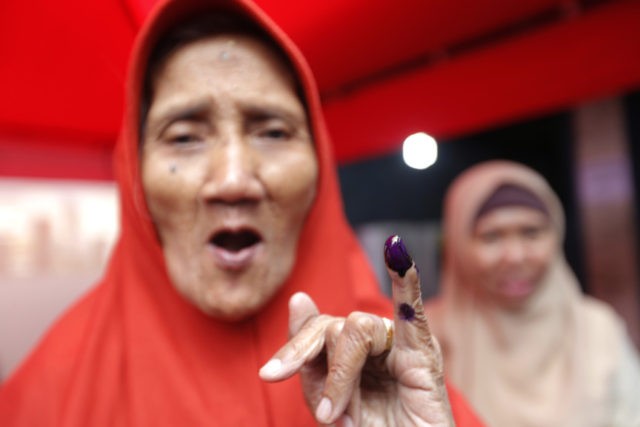Indonesia’s presidential election on Wednesday – the largest single-day election in history, with almost 193 million eligible voters casting ballots for 245,000 candidates spread across 17,000 islands – appears to have returned incumbent President Joko Widodo to office. Indonesia’s slide into hardline Islamism strongly influenced the election.
Early results showed Widodo, often known by his nickname “Jokowi,” leading challenger Prabowo Subianto by 55 percent to 44 percent. The final results will not be tallied and announced officially until May 22. The early count in Indonesia is seen as fairly accurate and Widodo went into the election with a roughly comparable lead in the polls.
Prabowo nevertheless challenged the early results and claimed to be in possession of exit polling data that showed he was the winner. He ominously warned his supporters to be on the lookout for “fraudulent counts at polling stations.” Prabowo threatened before the election that his supporters would stage mass demonstrations if they found the vote to be illegitimate.
Some glitches in the enormous and extremely difficult election process were reported – Indonesian election workers often find themselves boating out to remote islands and climbing mountains to deliver boxes of ballots – but election officials have not yet relayed any serious complaints of deliberate fraud.
One of the most serious errors reported so far was the delivery of tens of thousands of mail-in ballots pre-marked for Widodo in Malaysia, where questions were also raised about the competence of two senior election officials. The Indonesian election commission advised rerunning all 319,000 postal ballots from Kuala Lumpur to correct the mistake.
Widodo counseled Indonesians to be “patient” and “wait for the official result from the election commission.”
“Let us reunite as one as brother and sister in the same motherland after this presidential and parliamentary election is over, reuniting and tending to our brotherhood as members of the same nation,” he said.
The BBC quoted analysts who believe the election bodes ill for religious pluralism in Indonesia, which has been slipping toward Islamism after decades of boasting one of the most tolerant Muslim-majority societies in the world.
Widodo originally rose to fame as the pluralist mayor of Jakarta and a friend to his successor, a Christian named Basuki Tjahaja “Ahok” Purnama. Ahok was later convicted of blasphemy against Islam after mass protests.
Whatever his personal beliefs might be, Widodo found it expedient to put an admirable record of protecting Christians behind him and tack toward Islamism, choosing hardline imam Ma’ruf Amin as his running mate in 2019. Amin heads the Indonesian Ulema Council, an organization noted for issuing fatwa religious edicts against everything from homosexuality to Santa hats. He was also one of the organizers of the protests that put Ahok in jail for blasphemy.
Indonesia expert Made Supriatma of the ISEAS-Yusof Ishak Institute in Singapore told the BBC there was not much difference in the campaign platforms of Widodo and Prabowo, so “the only contrast they can draw is by showing their religious credentials.”
Supriatma called the election a “race to the right,” a “race to show who is more Islamic conservative.”
The New York Times on Wednesday saw Indonesia sinking deeper into strict Salafist ideology in the years to come, driven by huge infusions of academic expertise and mosque-building money from Saudi Arabia and Qatar. This path probably would not have changed if Widodo lost his re-election bid, because Indonesians increasingly view strict sharia law as the only antidote to corruption. Indonesian Muslims are increasingly adopting Arabic dress, architecture, and modes of religious expression, inspired by the sense that Saudi Arabia offers the purest form of Islam because Mecca is located there.
The alternative was Prabowo, a military strongman “who has shouted for jihad and vowed to welcome home from self-imposed exile Rizieq Shihab, the head of the Islamic Defenders Front, which gained notoriety for attacking nightclubs in Jakarta, the capital, and calling for sharia law.”

COMMENTS
Please let us know if you're having issues with commenting.